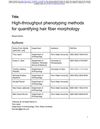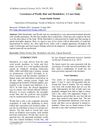 19 citations,
August 2000 in “International Journal of Dermatology”
19 citations,
August 2000 in “International Journal of Dermatology” Minoxidil and finasteride can slow or halt hair loss, but may have side effects.
 November 2021 in “Dermatology Research and Practice”
November 2021 in “Dermatology Research and Practice” The study aims to understand the skin and hair characteristics of mothers and their babies, and how these may affect newborns' skin health and mothers' postpartum hair loss.
 December 2011 in “Drug Research”
December 2011 in “Drug Research” The document shows the state of pharmaceutical patents as of 1999, focusing on treatments for various diseases.
[object Object] September 2022 in “Indian Journal of Paediatric Dermatology” Clouston syndrome is inherited in an autosomal dominant pattern and caused by a specific gene mutation, with no current treatment available.
 33 citations,
March 2017 in “Dermatologic Surgery”
33 citations,
March 2017 in “Dermatologic Surgery” Low-level laser therapy effectively treats female hair loss, increasing hair count by 51%.
 1 citations,
November 2020 in “bioRxiv (Cold Spring Harbor Laboratory)”
1 citations,
November 2020 in “bioRxiv (Cold Spring Harbor Laboratory)” Quantifying hair shape is better than using racial categories for understanding hair characteristics.
 1 citations,
January 2017 in “Social Science Research Network”
1 citations,
January 2017 in “Social Science Research Network” The document suggests creating a secure database for indigenous knowledge and recommends that the TKDL actively fight patents that slightly alter traditional knowledge.
 13 citations,
April 2001 in “International Journal of Dermatology”
13 citations,
April 2001 in “International Journal of Dermatology” Different types of scarring alopecia may be stages of one disease, and accurate diagnosis is crucial to prevent permanent hair loss.
January 2021 in “Springer eBooks” PRP might help with hair growth, but its effectiveness in hair transplants is unclear.
 October 2013 in “Journal of the American College of Cardiology”
October 2013 in “Journal of the American College of Cardiology” People with non-dipper hypertension have higher aldosterone levels, more strain on their heart's venous system, and increased risk of endothelial dysfunction.

Additive markers are most common and crucial for text coherence.
March 2023 in “Contagion” Most non-medical students at Tarumanagara University have good knowledge and attitudes about PCOS.
 March 2020 in “Journal of Laser Applications”
March 2020 in “Journal of Laser Applications” Photobiomodulation therapy significantly increases hair density and growth for androgenic alopecia, but more research is needed to confirm safety.
 4 citations,
August 2015 in “Medical Hypotheses”
4 citations,
August 2015 in “Medical Hypotheses” The conclusion suggests that the hormone ghrelin might link acid reflux to oily skin.
 February 1999 in “Drugs in R & D”
February 1999 in “Drugs in R & D” The document concludes that various drugs for men's health issues are in development, with treatments for sexual dysfunction and prostate conditions being the most advanced.
 125 citations,
January 1999 in “Drugs”
125 citations,
January 1999 in “Drugs” Finasteride effectively treats baldness but may cause sexual side effects.
February 2023 in “Archives of Dermatological Research” A multi-tiered treatment approach is crucial for managing hidradenitis suppurativa in patients with intellectual and developmental disabilities.
 December 1998 in “The American Journal of Cosmetic Surgery”
December 1998 in “The American Journal of Cosmetic Surgery” Hair restoration should focus on quality and value, not cost, to maintain the field's reputation and ensure patient satisfaction.
 3 citations,
January 2019 in “Annals of dermatology/Annals of Dermatology”
3 citations,
January 2019 in “Annals of dermatology/Annals of Dermatology” Hydroxychloroquine effectively treated twenty-nail dystrophy in a patient with alopecia areata.
269 citations,
October 2018 in “International journal of biological macromolecules” Hyaluronic acid is effective for skin rejuvenation and should be a key ingredient in cosmetic products.
 July 2023 in “Clinical, Cosmetic and Investigational Dermatology”
July 2023 in “Clinical, Cosmetic and Investigational Dermatology” The sharp implanter method for hair graft placement is simpler and faster, allowing for dense packing of grafts with natural results.
11 citations,
January 2010 in “Springer eBooks”  September 2021 in “Mağallaẗ al-Muẖtar li-l-ʿulūm”
September 2021 in “Mağallaẗ al-Muẖtar li-l-ʿulūm” Two sisters have rare hair disorders causing short, fragile, kinky hair.
[object Object]  2 citations,
January 2019 in “Indian Dermatology Online Journal”
2 citations,
January 2019 in “Indian Dermatology Online Journal” The congress concluded that misuse of antifungal drugs in South Asia has led to widespread treatment failure, and new approaches and regional cooperation are needed.
 1 citations,
April 2023 in “bioRxiv (Cold Spring Harbor Laboratory)”
1 citations,
April 2023 in “bioRxiv (Cold Spring Harbor Laboratory)” Climate-related nutritional stress may cause hair loss in juvenile male Guadalupe fur seals.
 1 citations,
February 2018 in “Plastic and Aesthetic Research”
1 citations,
February 2018 in “Plastic and Aesthetic Research” The KD spreader makes hair transplants safer and easier, especially for beginners, by reducing damage to hair follicles.
 271 citations,
June 2013 in “Human Reproduction”
271 citations,
June 2013 in “Human Reproduction” PCOS is common among Chinese women of reproductive age and linked to serious metabolic and reproductive issues, especially in obese women.
 June 2017 in “Advances in intelligent systems and computing”
June 2017 in “Advances in intelligent systems and computing” The new device can implant cell mixtures more effectively for hair loss treatment and is easier for operators to use.
 5 citations,
January 2017 in “Dermatologic Surgery”
5 citations,
January 2017 in “Dermatologic Surgery” Storing hair follicle micrografts for longer times can cause them to enter a state similar to the natural hair shedding phase, which might impact hair transplant results.
 2 citations,
January 2016 in “Archives of Aesthetic Plastic Surgery”
2 citations,
January 2016 in “Archives of Aesthetic Plastic Surgery” The technique effectively restores temporal peaks in hair transplants using different hair densities and angles in three zones.
























